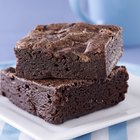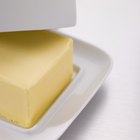
Scones are a deceptively simple thing to make. They're richer than American-style biscuits thanks to their use of butter and cream, but like biscuits they must be handled gently for the tenderest result. Other fats can be substituted in most recipes, if you're low on butter or want to cut down on saturated fats. Their flavor might suffer slightly, but you can work with that.
Margarine
The most direct substitution for butter is margarine, which has a buttery flavor and less saturated fat. Use regular margarine in sticks or blocks, rather than the soft, spreadable kind in tubs. Spreadable varieties and "lite" margarine contain more air and water, which works on a slice of bread but not in baking. If you're choosing margarine for health reasons, look for a brand that contains no hydrogenated or trans fats. If you're looking for a permanent substitution, try a few brands to see which gives your scones the best flavor.
Shortening and Lard
All-vegetable shortening works well in scones and biscuits, giving a light and flaky result. It's also suitable for vegetarians, vegans and the lactose-intolerant, if there are any in your family. Unfortunately it's a poor substitute for butter where flavor is concerned. Lard gives scones and other pastries an excellent texture, so it's a viable option in an emergency. Lard is also high in saturated fats, and can be problematic on religious or ethical grounds.
Coconut Oil
Coconut oil is a solid fat that works well in baking, and has many boosters touting its health benefits. If you're looking for a permanent substitution that's vegan-friendly, dairy-free and contains no hydrogenated or trans fats, coconut oil has much to recommend it. On the downside, it also gives your baking a faint but unmistakable hint of coconut aroma and flavor. If you can live with that, or consider it to be a positive feature, coconut oil can be your baking fat of choice for scones.
Adjustments
Butter only contains 80 to 85 percent fat, with the rest of its volume consisting mainly of water. If you're substituting other fats, reduce them by 1 tablespoon per cup and increase your liquids by the same amount. To provide a richer, more buttery flavor in your scones, replace up to 1/4 cup of the liquids with buttermilk, sour cream or plain yogurt. These will help compensate for the lack of flavor in your fats, though they're not suitable for vegans or the lactose-intolerant.
Related Articles

Cake Mix Alternative for Oil

How to Substitute Margarine for Butter ...

Substitute for 1 Square of Baking ...

What Can Be Used to Substitute for ...

What Can I Substitute Unsalted Butter ...

Can I Put Butter in Brownie Mix Instead ...

Substitutes for Butter When Baking ...

Canola Oil Vs. Lard in Baking

Can I Substitute Coconut Milk for ...

How Much Melted Shortening Do I Use in ...
How to Substitute Sour Cream for Oil in ...

Does Whipped Butter Have to Be ...

Does Canola Oil Taste the Same as ...

Greek Yogurt Instead of Butter in Baking

How to Replace Ingredients to Make ...

Can You Substitute Shortening for ...

Butter Substitute for Molten Lava Cake

Softened vs. Melted Butter When Baking

Baking Cookies With Greek Yogurt

What Is Vegetable Ghee?
References
- On Food and Cooking: The Science and Lore of the Kitchen; Harold McGee
- The Professional Pastry Chef; Bo Friberg
- The Cook's Thesaurus: Fats
Writer Bio
Fred Decker is a trained chef and certified food-safety trainer. Decker wrote for the Saint John, New Brunswick Telegraph-Journal, and has been published in Canada's Hospitality and Foodservice magazine. He's held positions selling computers, insurance and mutual funds, and was educated at Memorial University of Newfoundland and the Northern Alberta Institute of Technology.
Photo Credits
Jupiterimages/Photos.com/Getty Images